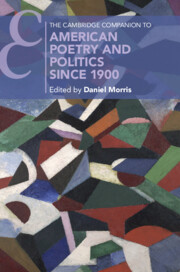Book contents
- The Cambridge Companion to American Poetry and Politics since 1900
- The Cambridge Companion to American Poetry and Politics since 1900
- Copyright page
- Contents
- Notes on Contributors
- Acknowledgments
- Introduction
- Chapter 1 The Space of Public Memory
- Chapter 2 Poetry and Propaganda
- Chapter 3 Depression-Era Poetics and the Politics of How to Read
- Chapter 4 The Politics and Poetics of Revolution
- Chapter 5 Wallace Stevens, Stanley Burnshaw, and the Defense of Poetry in an Age of Economic Determinism
- Chapter 6 The Line of Wit
- Chapter 7 US Poets on War and Peace
- Chapter 8 Institutions of American Poetry
- Chapter 9 African American Political Poetries
- Chapter 10 Our Terribly Excluded Blue
- Chapter 11 Poetry and the Prison Industrial Complex
- Chapter 12 “Oh Say Can You See”
- Chapter 13 The Political Resonances of Hip Hop and Spoken Word
- Chapter 14 Language as Politics in Twentieth- and Twenty-First-Century American Poetry
- Chapter 15 Renovating the Open Field
- Chapter 16 Transcultural Agency
- Chapter 17 Ecopoetry Now
- Chapter 18 The Politics and History of Digital Poetics
- Index
- Cambridge Companions to …
- References
Chapter 9 - African American Political Poetries
Published online by Cambridge University Press: 27 April 2023
- The Cambridge Companion to American Poetry and Politics since 1900
- The Cambridge Companion to American Poetry and Politics since 1900
- Copyright page
- Contents
- Notes on Contributors
- Acknowledgments
- Introduction
- Chapter 1 The Space of Public Memory
- Chapter 2 Poetry and Propaganda
- Chapter 3 Depression-Era Poetics and the Politics of How to Read
- Chapter 4 The Politics and Poetics of Revolution
- Chapter 5 Wallace Stevens, Stanley Burnshaw, and the Defense of Poetry in an Age of Economic Determinism
- Chapter 6 The Line of Wit
- Chapter 7 US Poets on War and Peace
- Chapter 8 Institutions of American Poetry
- Chapter 9 African American Political Poetries
- Chapter 10 Our Terribly Excluded Blue
- Chapter 11 Poetry and the Prison Industrial Complex
- Chapter 12 “Oh Say Can You See”
- Chapter 13 The Political Resonances of Hip Hop and Spoken Word
- Chapter 14 Language as Politics in Twentieth- and Twenty-First-Century American Poetry
- Chapter 15 Renovating the Open Field
- Chapter 16 Transcultural Agency
- Chapter 17 Ecopoetry Now
- Chapter 18 The Politics and History of Digital Poetics
- Index
- Cambridge Companions to …
- References
Summary
Because most African American poetry imagines social pasts, presents, and futures, most of this verse can be described as political poetry. What Cary Nelson says of political poets in general applies to many African American poets in particular: “historical contingency,” the mutability of society, “is the very marrow of their work” (5). From the beginning of the twentieth century to the 1960s, African American political poetry was often engaged with the southern Jim Crow regime that rose after the end of Reconstruction and with this regime’s northern counterpart, some features of which survive today in ostensibly race-neutral law and institutional practice. With the rise of Jim Crow came new Black institutions, among them literary magazines (e.g., The Colored American Magazine, The Voice of the Negro, The Horizon, and The Crisis) and literary societies (e.g., the Bethel Literary and Historical Association and the Boston Literary and Historical Association), and many of the new Black cultural institutions opened spaces where Black intellectuals could resist Jim Crow.
- Type
- Chapter
- Information
- Publisher: Cambridge University PressPrint publication year: 2023

